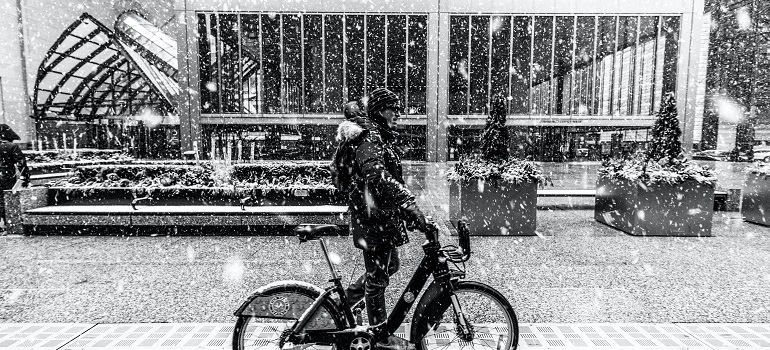Get Your Free Estimate Now
"*" indicates required fields
Considering a winter relocation to Toronto? You’re not alone. Toronto, a bustling Canadian city, attracts newcomers even during its snowy season. From its thriving arts scene to a strong job market, the city offers a lot. Still, winter here has its quirks. Navigating snow-covered streets and chilly temperatures can be a different ballgame. We are here to share valuable tips to help you adjust with ease. As you plan your move, know that reliable options exist for moving and storage Canada. Stick around, and we’ll guide you through both the joys and challenges that come with a Toronto winter.
The winter climate: What to expect
Toronto’s winter climate offers a mix of beauty and challenges. When the snow starts falling, the city takes on a fresh look. Snow adds a layer of brightness to the streets and parks, creating a cozy ambiance. Yet, the weather demands practical preparation. If you’re coming from a place with milder winters, packing for the Toronto chill can be a big task. For this, consider enlisting the help of packing services in Toronto. On the temperature front, prepare for cold days. The city experiences an average annual snowfall of 121 cm and temperatures can plunge to lows of -10°C or colder. Here are a few quick essentials for all of you considering a Toronto relocation this winter:
- To handle the cold, warm clothing is a must.
- Stock up on thermal layers, heavy coats, and waterproof boots.
- Equally important are quality gloves and scarves to keep your extremities warm.
- Also, consider your car. If you’re bringing a vehicle, winter tires are a necessity.
- Many residents also have a dedicated set of snow removal tools, like shovels and salt.
- Keep in mind that snowstorms can lead to unexpected delays, so it’s good to have a flexible schedule during your move.
So, while the winter climate has its merits, it’s essential to gear up appropriately to fully enjoy what Toronto has to offer.
Preparing for the move: Logistics in winter
Moving to Toronto in winter comes with both perks and hurdles. One of the big advantages is that long distance movers Toronto residents prefer are often less busy. This means you might find more availability and even get some off-season discounts. However, winter weather is a wildcard. Snowstorms or icy conditions can cause delays or make transportation hazardous. For this reason, having a plan B is always wise. In case of a weather setback, it’s crucial to have some wiggle room in your moving schedule.

If you’re downsizing, choosing the right kind of moving service can be beneficial. Specialized condo movers Toronto trusts are well-versed in handling the complexities of smaller spaces and building regulations. Another thing to consider is how your belongings will fare in the cold. Some items, like electronics and certain types of furniture, can be sensitive to freezing temperatures. Make sure to pack these items carefully and keep them insulated during the move. Also, don’t underestimate the amount of time it takes to move in winter. You’ll need to account for extra time to navigate snowy roads and potentially remove snow from your driveway or parking space. So, although winter might offer some logistical advantages, it requires meticulous planning to ensure a smooth move.
Real estate opportunities and challenges
Winter offers a distinct landscape for navigating Toronto’s real estate market. One of the most compelling advantages is less competition. Fewer people tend to buy homes during the colder months, which might give you some bargaining power. Sellers might be more willing to negotiate terms or prices, eager to close a deal during a slower season. But there’s a flip side to this benefit: fewer listings. The inventory of available properties usually dips in winter, which could limit your options.
When it comes to the type of property, Toronto has various kinds of real estate, including condos, townhouses, and detached homes. Each has its own set of challenges and advantages during winter. For instance, visiting a condo property during winter could give you an idea of how well the building is maintained during harsh weather. Are the sidewalks and parking areas well-cleared of snow? That could be an indicator of good property management.
Real estate red flags to be aware of during a winter relocation to Toronto
When you’re on a time crunch, especially given the speed at which properties can be bought or sold in winter, you might find it helpful to employ moving helpers Toronto relies on. They can assist in packing, moving, and even unpacking, making the whole process less stressful. But don’t forget the due diligence. Winter weather can hide property flaws. Snow can mask poor landscaping or exterior issues, and fewer daylight hours make it more challenging to inspect properties thoroughly. So, while winter may offer some unique advantages for buying property in Toronto, it also demands thorough research and quick decision-making. Both come with their own sets of challenges and require proper planning and professional assistance to navigate successfully.

Making your new home cozy: Winter essentials
Setting up your new Toronto home for winter is a crucial step after your move. You’ll want to ensure your living space is not just functional but also warm and inviting. With the help of furniture movers Toronto companies employ, you can smoothly get all your belongings, from large furniture to smaller, fragile items, safely to your new home. Once everything is in place, it’s time to think about heating. Toronto has several energy-efficient heating options like smart thermostats and energy-efficient furnaces that could save you money in the long run.
Be ready for initial expenses; a new heating system can cost between $2,000 and $6,000, depending on its type and efficiency. Upgrading an old system could set you back around $1,000 to $3,000. Also, anticipate a utility bill hike during winter, potentially increasing by 25-50%. Setting aside a budget for these extra costs is crucial. Insulation shouldn’t be overlooked either. Poorly insulated windows and doors can raise your heating bill by up to 20%. To tackle this, consider weather-stripping or window insulation kits, which usually cost between $5 and $20, as an economical solution for better insulation. Stocking up on winter essentials is also advisable, so make sure to get the items like:
- snow shovels
- salt for the driveway
- and adequate lighting for shorter days is also advisable
- Comfort items like extra blankets, warm socks, and hot water bottles can make winter nights more bearable
Thus, preparing your home for Toronto winter involves not just large-scale planning but also focusing on small details that contribute to your comfort.
Public transportation: Winter edition
Navigating Toronto in winter via public transit is usually a dependable choice. The subway system is the backbone of the city’s public transportation and it seldom faces delays due to snow. Buses and streetcars complement the subway service and are generally well-heated, offering a respite from the cold. A monthly adult TTC pass costs around $156, which could be a wise investment for daily commuting. While the TTC system is reliable, it’s a good idea to allow for some extra time in your commute. Snow and ice can still cause minor delays. Also, platforms and bus stops can be slippery, so exercise caution. If you’re planning to move specialty items like pianos, professional piano movers in Toronto can handle this for you, ensuring your valuable items are safely transported.

Notably, public transit is not the only option. For short distances, walking is often manageable if you’re dressed for the weather. Bike lanes are less crowded, although this mode of travel requires excellent winter tires and extra care. Car-sharing services and taxis are also plentiful but can become expensive if used regularly. Overall, public transit offers a balanced mix of affordability and convenience for winter travel in Toronto.
Toronto winter activities: Making the best of the cold
In Toronto, winter doesn’t mean you have to hibernate. The city offers a host of activities to keep you entertained and active.
- One of the most popular destinations is Nathan Phillips Square, where you can ice skate with a view of the iconic City Hall.
- For those interested in culinary adventures, the annual Winterlicious food festival is a must-visit. This event usually spans two weeks and features prix fixe menus from some of the city’s top restaurants. It’s a great way to sample different cuisines without breaking the bank.
- For families, there are numerous parks where you can go sledding or build a snowman.
- The city also has several ski slopes within driving distance for those keen on winter sports.
- Staying active during winter is not only fun but also helps combat the winter blues. Toronto offers various indoor facilities like swimming pools and gyms that remain open throughout the season.
If you’re moving closer to such activity hubs, midtown Toronto movers can make your move efficient. This allows you to unpack and get involved in the city’s winter scene more quickly. Whether you’re into sports, food, or simply taking a winter walk along the snow-covered streets, Toronto has something for everyone. Planning your activities can help you make the most of the city’s winter offerings and make your cold-weather move more enjoyable.

Winter healthcare: Staying well in the cold
Keeping healthy during a winter relocation to Toronto is crucial, especially as cold and flu cases tend to spike during the colder months. Toronto’s healthcare system is well-equipped to deal with this seasonal increase. Walk-in clinics are abundant throughout the city, and getting a flu shot is relatively straightforward. Some clinics even offer them for free during peak flu season. For non-emergency situations, Telehealth Ontario provides free medical advice over the phone.
While healthcare services are robust, it’s essential to take preventative measures. Stock up on vitamins and over-the-counter medicines as you’re settling in. Good nutrition and regular exercise can also help boost your immune system. If you’re relocating within the city, local movers in Toronto can assist with a smooth move, reducing stress that could otherwise weaken your immune system. Emergency services in Toronto are well-prepared for winter weather, including snowstorms and icy conditions. Ambulances, fire trucks, and police vehicles are equipped to handle the challenges of winter driving. The average response time for EMS is about 11 minutes, which remains fairly consistent even in winter.
Networking and social life: Winter impacts
The winter season in Toronto can have a noticeable impact on your social life, but it doesn’t have to put it on hold. The city is teeming with indoor activities and networking events geared towards professionals, students, and people from all walks of life. Business-focused meetups and casual social mixers often move indoors, taking place in cozy coffee shops, versatile co-working spaces, and even hotel lobbies. It’s true that the cold weather can affect your mood, sometimes leading to a mild form of winter depression known as Seasonal Affective Disorder (SAD). Taking steps to counteract this, like regular exercise and vitamin D supplements, can be beneficial. Toronto offers plenty of indoor gyms and even indoor beaches for volleyball to help you stay active and social.

Moreover, winter gives you a unique opportunity to engage in seasonal Canadian traditions. There’s something quite bonding about coming together to watch a hockey game or enjoy a hot beverage. Such activities give you not only a sense of the local culture but also a way to meet new people. So while winter may pose some challenges to an active social life, a bit of planning and a willingness to embrace the indoor culture can go a long way. Keep an eye on local event listings and social media groups to find activities that interest you.
Is the winter relocation to Toronto a good choice for you?
Deciding on a winter relocation to Toronto? It’s a choice filled with both opportunities and obstacles. Toronto’s winter offers unique advantages like less competition in the real estate market and easier scheduling with moving companies. However, you’ll also face cold temperatures and snow. January tends to be the coldest month, while December offers a balance between milder weather and off-season moving benefits. So, if you’re leaning toward a winter move, consider doing it in December. Whatever you decide, a positive approach and meticulous planning can make your experience enjoyable. Reliable professional movers can make your move efficient and stress-minimizing, helping you to kickstart your new life in high style.
Contact Us
Get access to a variety of moving and storage Canada solutions:

Contact Our team
Call Professional Movers Canada or fill out our free moving quote form.

Get Your Quote & Plan
Receive an obligation-free estimate and a detailed plan of action for your move.

Enjoy a Professional Move
Leave all the vexing tasks of relocation to our skilled Canada movers.